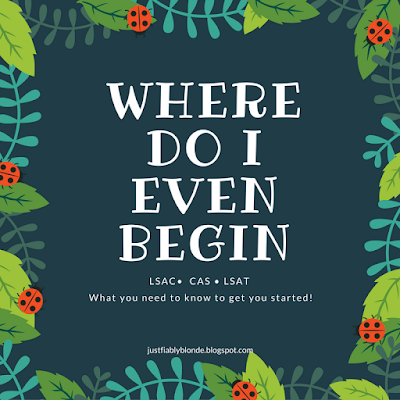"What the hell is a logic game? How am I supposed to know the 12 different LR question types? Will I have enough time to read all 4 RC passages?"
There are many pieces that make up a law school application; all which admissions takes into account. But I would say that the besides your undergraduate GPA, the other important factor is the LSAT Score. The what? The LSAT!
If you aren't aware of what the LSAT is, that’s completely OKAY! I had no clue until I was a sophomore. The LSAT is short for the Law School Admissions Test. It is made up of 6 sections total – 4 of which are graded, 1 is an ungraded experimental and then a writing sample which is scored between a 1-4 and doesn’t count towards your total LSAT Score. A perfect LSAT score is 180 and the scoring begins at 120. Each section is 35 minutes and for the first 5 sections you have between 25- 27 questions to answer. Check out my post on the LSAT, First Things First which includes helpful links about the exam.
What is on each section?
Well here's the fun part, there are actually only 3 sections all together: Logic Games ( top right) , Logical Reasoning (bottom left) and Reading Comprehension (bottom right).
How are they divided up?
No matter what you will always have 1 Logic Game section, 1 Reading Comprehension Section, and 2 Logical Reasoning Sections; The remaining section can be any one of the 3. Also there is no way to know when each section will take place.
**I will not lie to you and say that this test is easy. It's not. But I will tell you that it's manageable, and if you put in the time studying and learn how to take the test, you will do well.
Side note: Begin studying at least 3 months in advanced, if possible, the summer before your senior year. This is the best time for many reasons but the main one is that during the summer months one typically does not have classes so you can focus your time on preparing for the exam. Even if you are taking summer classes, you can still effectively and successfully prepare for this exam. REMEMBER, it's only ONE SUMMER. Its not the end of the world. The best tip I can give you is MAKE A STUDY GUIDE AND STICK TO IT. But more on that in a bit.
How is the test Graded?
This is something everyone wants to know, and you should understand the grading because it's important. The best way to explain this is through a photo;

For the LSAT you have a Raw score that then converts to your LSAT score & where you rank in percentile. The Raw Score tells you exactly how many questions you answered right. KEEP IN MIND: THE LSAT DOES NOT PENALIZE YOU FOR WRONG ANSWERS & EACH QUESTION IS WEIGHED EQUALLY.
The Raw score is then converted into an LSAT score which is on a scale from 120 - 180. You can fall any where within this range. Its not strictly a 120 or 150, you could receive a 133 or 167. It all depends on how many you answer correct.
Once your Raw score is converted into a LSAT Score, you'll then know where you fall in terms of Percentile. The Percentile just shows the number of people who scored below your score. Where as the LSAT Score is based off of your specific exam, the Percentile Score is based off of a three year period prior to the one you took.
For more information on scoring, refer to Alpha Score
Have any addtiontional comments, questions, suggetions related to the Exam Makeup or Scoring? Feel free to comment below or email me directly; I will be happy to help in any way!
How is the test Graded?
This is something everyone wants to know, and you should understand the grading because it's important. The best way to explain this is through a photo;

For the LSAT you have a Raw score that then converts to your LSAT score & where you rank in percentile. The Raw Score tells you exactly how many questions you answered right. KEEP IN MIND: THE LSAT DOES NOT PENALIZE YOU FOR WRONG ANSWERS & EACH QUESTION IS WEIGHED EQUALLY.
The Raw score is then converted into an LSAT score which is on a scale from 120 - 180. You can fall any where within this range. Its not strictly a 120 or 150, you could receive a 133 or 167. It all depends on how many you answer correct.
Once your Raw score is converted into a LSAT Score, you'll then know where you fall in terms of Percentile. The Percentile just shows the number of people who scored below your score. Where as the LSAT Score is based off of your specific exam, the Percentile Score is based off of a three year period prior to the one you took.
For more information on scoring, refer to Alpha Score
Have any addtiontional comments, questions, suggetions related to the Exam Makeup or Scoring? Feel free to comment below or email me directly; I will be happy to help in any way!











